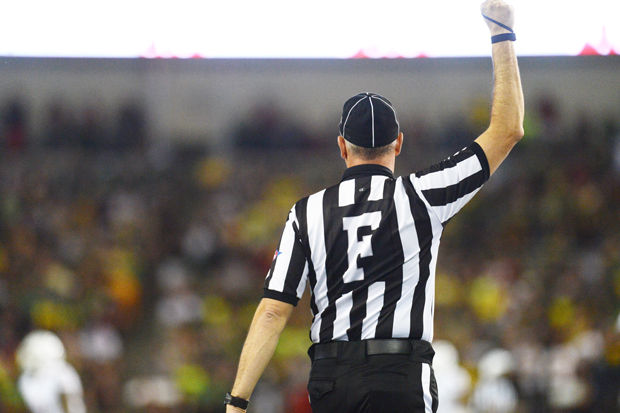Pac-12 referees need to start making the correct calls
November 12, 2014
Election season wrapped up last week, and not a single candidate addressed the most prevalent issue plaguing the country today.
The issue of Pac-12 officiating.
It is beyond awful, and it’s getting to the point where I’m about ready to stop watching football. I think I would get less worked up listening to Bud Nameck and Jason Gesser on the Cougar radio broadcast. This way, I could still monitor my favorite college football team, and not subject my eyes to the officiating atrocities on the field.
People have been complaining about Pac-12 officiating long before the conference was the Pac-12. This much has been acknowledged by countless articles published throughout the years. The officiating trend seemed to be on the way up the last couple years, after the hiring of Tony Corrente as the coordinator of officials in 2011.
But after a bad first few weeks of the season, Corrente resigned in October, upsetting everyone from fans to coaches to the Pac-12. Apparently Corrente couldn’t take the heat, but at least there is heat. Things have been too bad for too long, and it’s going to take more than an officiating coordinator to fix things.
All 12 teams in the conference have been negatively affected by poor officiating, but none more than the Cougars. Exhibit A—the Oregon game. Down a touchdown late in the game Isiah Myers was practically tackled long before the ball even got to him on fourth down. The result was a turnover on downs and another loss for the Cougs. A win could have shaped the season, given the team a massive amount of confidence, and most likely got them to a bowl game.
Especially when you consider exhibit B—the Cal game. Down one point with less than 30 seconds left, Gerard Wicks reached the ball across the goal line for what should have been the go ahead touchdown. The officials incorrectly spotted the ball at the one-yard line, and everyone knows what happened next.
The play should have at least been reviewed considering Connor Halliday called a time out which gave officials plenty of time to look things over. In a 2010 game at UCLA, the referees reviewed a Cougar touchdown after the extra point was kicked, and reversed it. As a result the Cougars didn’t take the lead and lost the momentum, as well as the game.
These two blown calls could have led to two more wins, and instead of being 3-7, the Cougs could be 5-5, with at least one more winnable game on their schedule. Who knows, the two extra wins could have led to more confidence and better performances against Arizona and USC.
Just when I thought things couldn’t get any worse, last weekend’s Oregon State game happened. Yes, the Cougars won, but if you are going to be a ref critic, you have to do it under all circumstances.
Up a touchdown in the fourth quarter, Luke Falk threw a pass to Tyler Baker who ran into the end zone, giving the Cougars a two-touchdown lead. Baker broke a weak ankle tackle and could have walked into the end zone on needles before another Beaver defender had time to get to him.
But the referee blew his whistle, and the play was dead. The consensus is because Rickey Galvin came in and laid a block behind the play that just about knocked him out. Whether the block occurred or not, Baker still would have scored, but the official blew his whistle anyway.
When has a play ever been stopped for an injury?
Never.
Luckily, the Cougars scored the very next play and the sequence will probably be forgotten in the long run. But it just would have been so WSU-like to not score, and it is worth pointing out inexplicably bad calls.
Then later in the game, Daquawn Brown, arguably the best defensive player on the team, perfectly lowered his shoulder into the chest of the receiver on the play, Terron Ward. Because Ward apparently can’t take a hit in the Pac-12, the refs bailed him out, calling a 15-yard targeting penalty and kicking Brown out of the game.
By looking at the replay, a reasonable person can deduce that the hit was shoulder to shoulder, thus not qualifying as targeting. It was a clean football play, one that attracts fans to the game in the first place.
To incorrectly call this at such a pivotal point in the game is inexcusable.
A first half play involving a first down catch by Vince Mayle would have more appropriately called, but it wasn’t. After making the catch, a safety was standing right there, and put the crown of his helmet right in Mayle’s chest.
No call.
Not only does it seem like the refs were trying to cost the Cougars the game, they did everything they could to hurt their chances in their next game against Arizona State. By rule, Brown will not be able to play in the first half of that contest.
There are usually one or two bad calls that go against teams in the Pac-12 per season, but no other season comes close to the volume of bad calls in the conference this season. After an upward trend, Corrente resigned, and things are worse than they were before his regime.
At this point, one can wonder if the conference is ever going to figure it out.








